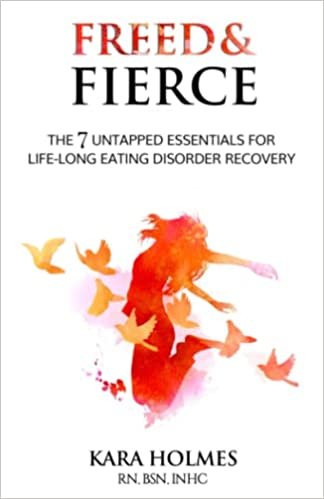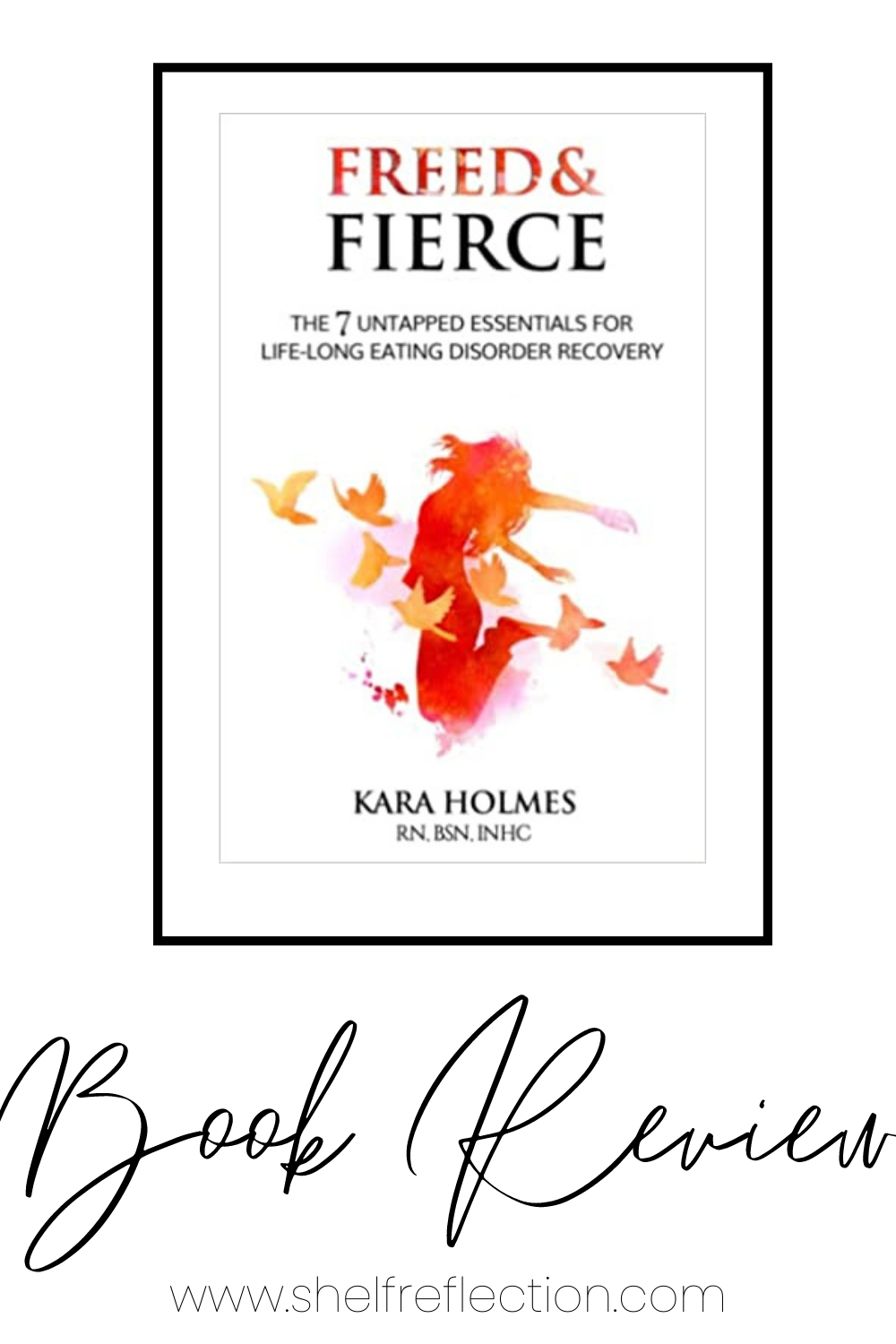Freed & Fierce
Freed & Fierce: The 7 Untapped Essentials for Life-Long Eating Disorder Recovery
By: Kara Holmes
“The ultimate purpose of this book is to instill in you excitement, hope, and help you feel strong, fierce, and empowered to do the hard, yet rewarding, things. I want you to just ‘know’ with every fiber of your being that you can recover (even if you’ve already tried “everything”), and that you have a beautiful, vibrant life awaiting!”
Kara struggled with an eating disorder for 11 years. She felt like she had tried everything and nothing was working. Recovery seemed impossible.
Until she approached her eating disorder more holistically.
The heart of this book is Kara sharing with readers what worked for her and encouraging others that recovery is possible, especially if we treat more than just our behaviors.
Kara now works as a Holistic Eating Disorder Recovery Coach. She has a Facebook group that may be beneficial for you to join for support and further resources.
I, personally, have not struggled with an eating disorder. So I can’t speak on whether or not her methods and suggestions feel challenging or effective. It was informative for me to understand more of what struggles people with eating disorders face.
Her chapter on nutrition is applicable to all people, though I understand there are lots of theories on diet and nutrition. Her theory doesn’t involve restriction but thoughtful choices and moderation which I feel like is the most realistic path of change.
She does acknowledge that this book is not meant to replace any professional advice from therapists, specialists, or doctors so I think that’s important to remember.
My Takeways
Her first chapter talks about why eating disorders develop and some of the risk factors that interact when a triggering event occurs. She also talks about protective factors like a good support system.
This chapter was particularly helpful to me to think through as a parent of two daughters. What messages may I be sending them that influence how they think about themselves or about what a woman’s body “should” look like? Am I constantly looking in the mirror in disappointment? Do I make a lot of comments about others’ bodies? Do I often vocalize things I wish I could change about my body?
I think it was a great reminder to show body confidence, not body preoccupation and to make sure my daughters know that their emotional needs are important to me. Kids pick up on and tend to emulate the behaviors and beliefs of their parents and I have a responsibility to create a safe environment for them to grow in confidence.
I also liked how she talked about Cognitive Behavioral Therapy (CBT). I was first introduced to this through the book The Coddling of the American Mind. They say:
“The evidence that CBT works is overwhelming. A common finding is that CBT works about as well as Prozac and similar drugs for relieving the symptoms of anxiety disorders and mild to moderate depression, and it does so with longer-lasting benefits and without any negative side effects… CBT...is the best-studied form of psychotherapy… it is both safe and effective.”
CBT is relevant to their research on college campuses because they are looking at how people think (or don’t think) and how this affects relationships with others and people’s ability to find truth. They explore more about what ‘safe spaces’ means for college campuses when words mean violence and people use emotional reasoning.
Either way, CBT is an important and effective way for all people to understand because it causes us to think through our ways of thinking. This may seem confusing, but I was suprised how often my thinking is distorted and situations misinterpreted. Here is a helpful quick link guide to CBT that I think you’ll find helpful! (Some examples Kara mentions are ‘All or Nothing Thinking,’ ‘Jumping to Conclusions,’ ‘Overgeneralization,’ and ‘Catastrophizing.’)
Kara’s 7 Pillar System
She has presented her holistic approach to eating disorder recovery as a 7 Pillar System:
Mindset
Your Life’s Vision
Building Habits for the Life of Your Dreams
Engaging your Support System
Spirituality and Forging Your Identity
Nurturing the Physical Body for Recovery.
Mental Toughness & Resilience
Kara claims “You won't find the content inside this book anywhere else because it comes from my own lived experience of my eating disorder and recovery process.”
I don’t think that’s necessarily true. Maybe all in one place, I haven’t done enough research to know. But I wouldn’t say they are groundbreaking and completely original ideas.
However, that doesn’t mean they’re worthless. I think it makes sense that to experience a life-long life change of any kind would require aligning your mindset with your habits, identity, and behavior. That you would envision what your life should look based on your core beliefs. And that you would need support from others and resilience to the difficulties life brings.
With each pillar, Kara gives examples of how to do it and even some exercises for the reader to stop and complete before continuing. In this regard, you’ll only get out of this book what you put in. Just reading it is not going to transform your life, but if you’re willing to do the work and spend time reflecting on yourself and your beliefs, I think her book can guide you to transformation.
Caveats
As I said, I can’t tell you whether or not this pillared system will ‘work’ for you. My caveats are not with her holistic approach.
These are just a couple thoughts I had while reading.
When she talks about the nutrition and eating side of things, I felt like it didn’t seem realistic for someone in the circumstances I’m in— a stay-at-home mom of four littles.
Meal times for me are the worst. They are hectic and messy with lots of whining and crying and time crunches. She suggests savoring each bite and really enjoying your food. That it helps you eat less and enjoy the act more. Well, eating my food is one of the least enjoying parts of my day. I don’t think ‘savoring’ my food is an option or taking more than ten minutes to eat it.
Plus making meals that my kids would eat and that are good for me would require a lot of extra work.
I’m assuming there are women out there struggling with eating disorders that are busy moms of little kids and I wish she would have included some adaptations or suggestions for women who can’t do the ‘ideal’ actions.
The other thing that bothered me was her chapter on Spirituality and Forging an Identity. She shares that her own spirituality is in God and that her relationship with God is where she finds her identity and where she found strength and help for her recovery.
But she promotes a very general spirituality.
She says this:
“There is more to spirituality than belief in God, a Higher Power, or religion. If you don’t believe in God, you can still embrace your spiritual side…
The key takeaway when it comes to spirituality versus religion, is that you can be spiritual without having to commit to a specific religion. Spirituality and religion are not one in the same: spirituality often holds unique meaning to different people,
While religion is based on fixed beliefs and practices that are shared by all who follow that religion, spirituality is much more all-encompassing and individual… Spirituality is more about making your own meaning and developing your own beliefs that guide you in life and that bring you a sense of inner fulfillment.”
I get that her intent in this book is not to convert people to Christianity. The core of the book is about the 7 pillars, not just the ‘spirituality’ pillar. So can I fault her for wanting to be inclusive?
I don’t know.
I think I would have rather she just approached that chapter sharing her relationship with God and how she found her identity in the power of Christ and how He gives her strength to fight the thoughts and the desires of the flesh that harm her mindset, her perception of herself, and her body. And then just leave it at that.
I don’t expect her to try to convince people to become Christians, but just share what helped her.
But she goes a step farther and says, ‘Here’s what helped me, but if you don’t believe in God, then just “develop your own beliefs” and define your own standard for “inner fulfillment.”
But if they’re not seeking God, I’m not sure what power they’re really tapping into.
And I might argue that people are already developing their own beliefs and striving for self-fulfillment and is it possible this is what contributed to where they are now anyway?
I would argue, the problems we have as humans are within. We can’t look inside ourselves for life-changing power.
It seems harmful to encourage people to seek spirituality of their own making and to look inward for fulfillment.
I also don’t like the phrase “having to commit to a specific religion” as if it’s a potentially risky decision to join a club or sign a contract.
Trusting in God isn’t a transaction, it’s a life-changing relationship. It’s not ‘deciding to commit’ and hoping for the best. It’s understanding the immense love our Creator has for us demonstrated by his sacrifice for us on the cross. It’s faith and obedience in a sovereign God who is trustworthy and empowers us to pursue goodness and life-change.
If you truly encounter Jesus, there isn’t a pro/con decision-making session, we are confronted with our NEED for a Savior and we joyfully enter into God’s family, his love, his protection, and his hope, thankful he has saved us, and finding our identity in him.
Anyway, I know many won’t agree with me on that, but that’s my thoughts on that chapter.
Conclusion
Overall, this seems like it would be a helpful book for people who are seeking recovery from an eating disorder. It would also be beneficial for people who want to address harmful thought patterns they have about any habit they struggle with, or people seeking to reflect on their life holistically.
She mentions opportunities for 1:1 coaching so if this book isn’t enough for you, it would be good to not only seek professional help, but a relationship with a coach like Kara who can offer more personalized help and accountability. More info on that can be found on her facebook link I listed above.
I’ll end with this good reminder she has for us:
“We are aiming for a slow, steady, lifelong recovery and not a 'quick-fix solution”
Real transformation takes time.
I like that two of her mantras she would tell herself every day were:
“The small steps I take each day make my recovery possible” and “I choose to get better every day.”
It’s easy to get ahead of ourselves and when we can’t see major change to give up and feel overwhelmed. But just think about What About Bob’s method- Baby Steps! right?
The little things we do every day matter. Our mindset each day matters. Change is possible!
**Received a copy in exchange for an honest review**
Share this book review to your social media!


